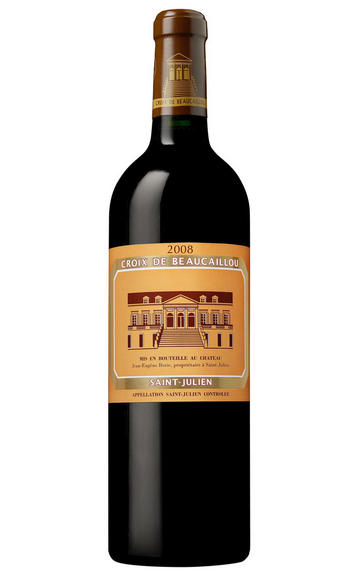
2008 Château Ducru-Beaucaillou, St Julien, Bordeaux
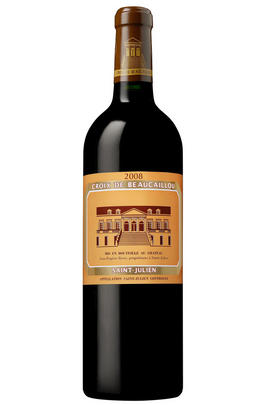
Critics reviews
Robert M. Parker, Jr. - 02/05/2011
Jancis Robinson MW - jancisrobinson.com - Apr 09
James Suckling - Wine Spectator - Apr-2009
In Bruno Borie’s words, the 2008 Ducru Beaucaillou is “well above 2004, with much more structure than 2007, and more sensuality than 2006.” I would add that it is even better than that, and as profound as the 2005. This 85% Cabernet Sauvignon and 15% Merlot blend reveals a dense opaque purple color as well as a gorgeously sweet bouquet of spring flowers, creme de cassis, blackberry liqueur, licorice, espresso roast, and spice. A testament to the density and richness of this wine is the fact that no oak is apparent in the aromas or flavors.
Robert Parker- Wine Advocate - Apr 09
About this WINE
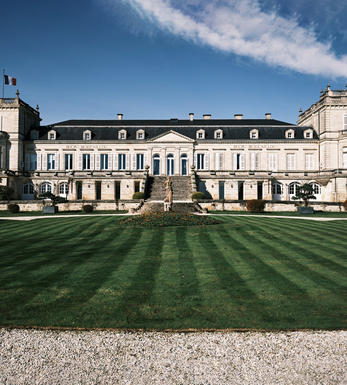
Chateau Ducru-Beaucaillou
Château Ducru-Beaucaillou is a St-Julien property that today is one of the leading Super Seconds. It is owned by the Borie family and is situated in the south-east of the St-Julien appellation. Ducru-Beaucaillou's 50 hectares of vineyards (Cabernet Sauvignon 65%, Merlot 25%, Cabernet Franc 5% and Petit Verdot 5%) lie on deep, large-stone gravel beds enriched with alluvial soil deposits and with a high clay content. The wines are matured in oak barriques (50-60% new) for 18 months.
For many, Ducru-Beaucaillou is the quintessential St-Julien - deep-coloured, powerful, ripe, exquisitely well-balanced and perfectly harmonious. It requires a minimum of 10 years of bottle ageing before it should be approached and the best vintages will continue improving for many more years. Ducru-Beaucaillou is classified as a 2ème Cru Classé.
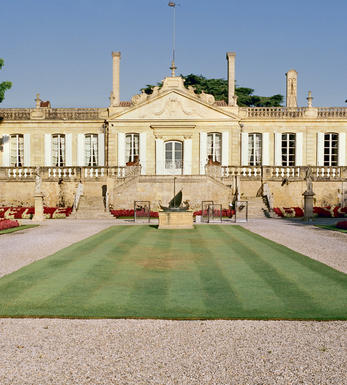
St Julien
St Julien is the smallest of the "Big Four" Médoc communes. Although, without any First Growths, St Julien is recognised to be the most consistent of the main communes, with several châteaux turning out impressive wines year after year.
St Julien itself is much more of a village than Pauillac and almost all of the notable properties lie to its south. Its most northerly château is Ch. Léoville Las Cases (whose vineyards actually adjoin those of Latour in Pauillac) but, further south, suitable vineyard land gives way to arable farming and livestock until the Margaux appellation is reached.
The soil is gravelly and finer than that of Pauillac, and without the iron content which gives Pauillac its stature. The homogeneous soils in the vineyards (which extend over a relatively small area of just over 700 hectares) give the commune a unified character.
The wines can be assessed as much by texture as flavour, and there is a sleek, wholesome character to the best. Elegance, harmony and perfect balance and weight, with hints of cassis and cedar, are what epitomise classic St Julien wines. At their very best they combine Margaux’s elegance and refinement with Pauillac’s power and substance.
Ch. Léoville Las Cases produces arguably the most sought-after St Julien, and in any reassessment of the 1855 Classification it would almost certainly warrant being elevated to First Growth status.
Recommended Châteaux: Ch. Léoville Las Cases, Ch.Léoville Barton, Ch Léoville Poyferré, Ch. Ducru-Beaucaillou, Ch Langoa Barton, Ch Gruaud Larose, Ch. Branaire-Ducru, Ch. Beychevelle
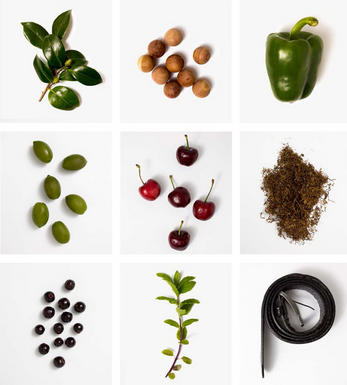
Cabernet Sauvignon Blend
Cabernet Sauvignon lends itself particularly well in blends with Merlot. This is actually the archetypal Bordeaux blend, though in different proportions in the sub-regions and sometimes topped up with Cabernet Franc, Malbec, and Petit Verdot.
In the Médoc and Graves the percentage of Cabernet Sauvignon in the blend can range from 95% (Mouton-Rothschild) to as low as 40%. It is particularly suited to the dry, warm, free- draining, gravel-rich soils and is responsible for the redolent cassis characteristics as well as the depth of colour, tannic structure and pronounced acidity of Médoc wines. However 100% Cabernet Sauvignon wines can be slightly hollow-tasting in the middle palate and Merlot with its generous, fleshy fruit flavours acts as a perfect foil by filling in this cavity.
In St-Emilion and Pomerol, the blends are Merlot dominated as Cabernet Sauvignon can struggle to ripen there - when it is included, it adds structure and body to the wine. Sassicaia is the most famous Bordeaux blend in Italy and has spawned many imitations, whereby the blend is now firmly established in the New World and particularly in California and Australia.


Buying options
Add to wishlist
Description
Tasting at Ch. Ducru-Beaucaillou is a surreal experience. To say that the Borie family have an unusual taste in modern art is an understatement but once you get past the flamboyant bright orange-yellow décor and copper filigree sliding doors of the tasting ‘tunnel’, the 2008 wine was by far the finest Ducru we had ever tasted. Bruno Borie attributes the triumph of 2008 to his 45-strong team who had worked together meticulously to create this enormously pure, clean and complex Ducru with sophisticated, supple tannins and gorgeous, fat, juicy fruit. Sensational. Ducru’s tasting note compares this wine to ‘a Roman construction, all in roundness, but imposing’. PR spin perhaps but, in 2008, we are forced to agree. Sensational.
wine at a glance
Delivery and quality guarantee